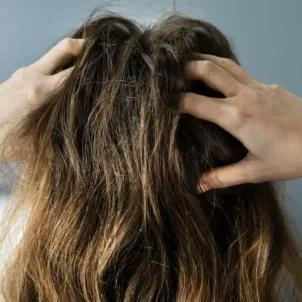Trying to discover the truth behind what causes men’s hair loss? Along the way, you’ll probably run into several myths.
For instance: “You’ll go bald if your mother’s father went bald” (or some variation) is commonly uttered in mixed company.
There’s some logic to this claim, because the X chromosome (which comes from the mother) does carry the androgen receptor gene—a gene implicated in male pattern baldness.
But here are three reasons to doubt it:


- The gene in question is just as likely to be inherited from the maternal grandmother as the maternal grandfather. (Was grandma bald?)
- Many other genes are associated with hair loss. These genes come from both mom and dad.
- Genetics aren’t the only cause of hair loss.

What Is Male Pattern Baldness?
Male pattern baldness is the most common type of hair loss in men. How common? Put a hundred 50-year-old men in a room and, on average, 50 of them will be losing their hair in predictable patterns. This type of hair loss, called androgenetic alopecia, doesn’t only affect males. It also affects about 55 percent of females over the age of 80. Here, we’ll be covering male pattern hair loss (not female pattern hair loss), though the causes and remedies largely overlap. It’s easy to spot the signs of male pattern baldness with two defining features:- an M-shaped balding pattern on the front of the head
- baldness on the crown

What Causes Hair Loss in Men?
Men’s hair loss doesn’t have one cause, but several. Here are the top four.1. Genetics
Researchers believe that most cases of male pattern baldness can be traced back to the activity of certain genes. The genes that “go wrong,” if you will, are the genes governing the actions of androgens. Androgens, such as testosterone and dihydrotestosterone, play an important role in hair growth. Recall the androgen receptor gene from earlier. This gene, as the name suggests, makes androgen receptors that attach to your hair follicles. When this gene stops working properly, hair growth stops working properly too. Specifically, androgen receptors govern the extent to which dihydrotestosterone (DHT) stimulates your hair follicles. Too much stimulation from this testosterone derivative equates to accelerated baldness. If your head isn’t spinning yet, just wait for this next one. In a 2015 paper, researchers identified 29 (yes, 29) genetic mutations linked to hair loss! Needless to say, we’re a long way from fully understanding the genetic underpinnings of baldness.2. Hormonal Imbalances
Testosterone is the primary male sex hormone, known for lending virility and strength. Is it true what they say—that baldness is a sure sign of high testosterone? It’s a controversial topic. For instance, a 2018 study on 239 Chinese men found that those with male pattern baldness had higher free testosterone levels. But another study on 373 German men found “no associations between sex hormones and hair loss in men from the general population.” It would seem, based on that last result, that baldness isn’t a reliable indicator of high testosterone. If it were, you’d see the correlation everywhere you looked. That said, the other hair loss hormones to watch include:- Thyroid. Those with hypothyroidism (low thyroid hormones) suffer from hair loss that gets better when thyroid hormones are replaced.
- Insulin. Problems with insulin, your blood sugar balance hormone, are linked to hair loss in both men and women.
- Cortisol. Stress and its related hormones (like cortisol) aren’t friends of healthy hair.
3. Stress
Pulling your hair out from stress? It may come out rather easily. Some experiments on mice suggest that, when the little guys are exposed to a stressful stimulus (a loud noise or paw shock), they experience a spectrum of physiological changes that results in hair loss. The technical term for this stress-induced temporary hair loss is telogen effluvium. And it appears that, along with mice, humans can get telogen effluvium too.4. Nutrient Deficiencies
Finally, deficiencies in the following nutrients have been linked to hair loss:- Iron. It’s unclear which iron levels are optimal, but reversing iron deficiency in mice does result in the restoration of hair growth.
- Zinc and copper. One study found that 312 patients with alopecia were more likely to have zinc and copper deficiencies (measured in hair samples) than controls.
- Protein. Supplementing with the amino acid lysine (found in most protein sources) has been shown to lessen hair loss in iron-deficient women.
- Vitamin D. This all-important vitamin/hormone helps hair follicles function properly.
- Biotin. People deficient in biotin regrow lost hair once biotin status is restored.
How to Stop Men’s Hair Loss
Conventional hair loss treatments for men include medications like Rogaine (minoxidil), Proscar, and Propecia (finasteride). While these drugs sometimes work, they often come with undesirable side effects that range from scalp irritation to impotence. Below are three low-risk natural remedies for hair loss to consider instead.1. Eat a whole foods diet
Eating nutrient-rich, plant-based whole foods like vegetables, nuts, and fruits provides the raw materials for your body to produce hair and hair-helping hormones. Plus, it’s the best way to avoid nutrient deficiencies linked to hair loss.2. Manage Stress
Try deep breathing, meditation, yoga, or exercise to beat stress and reduce the chance of hair loss. Need another simple way to keep stress levels down? Get a great night’s sleep.3. Consider Supplementation
Work with a medical professional to ferret out any nutrient deficiencies, then supplement accordingly. If you suspect a biotin deficiency, for example, consider taking a biotin supplement.Final Thoughts
Are the above strategies guaranteed to prevent or reverse hair loss? Unfortunately, no. If the roots are genetic, you might simply have to live with it—at least until some major scientific breakthroughs occur. Luckily, these strategies aren’t only good for your hair, but they’re good for your general health too. We like it when that happens.More like this










